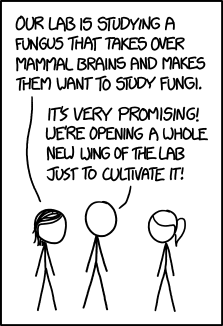1664: Mycology
| Mycology |
 Title text: Conspiracy theory: There's no such thing as corn. Those fields you see are just the stalks of a fungus that's controlling our brains to make us want to spread it. |
Explanation
| This is one of 60 incomplete explanations: First cut, please help with explanation and definition of mycology.. If you can fix this issue, edit the page! |
Cueball and Megan are studying a fungus that takes over the brains of mammals and makes them want to study the fungus. This is a reproductive tactic by the fungus, since the fungus makes the mammal whose brain it took over want to study the fungus, which means that mammal will need to produce more of the fungus to study it. Cueball and Megan are most likely themselves being controlled by the fungus, since they want to cultivate the fungus as much as possible.
This is an allusion to fungi such as Ophiocordyceps unilateralis which manipulates its hosts to aid its propagation.
The title of the comic refers to Mycology, the study of fungi
This is likely a reference to various species of cordyceps fungi, which can infect the brains of insects causing behavior advantageous to the reproduction or spread of the fungus.
Transcript
| This is one of 40 incomplete transcripts. Please help by editing it! |
[Cueball and Megan are talking to Ponytail.]
Megan: Our lab is studying a fungus that takes over mammal brains and makes them want to study fungi.
Cueball: It's very promising! We're opening a whole new wing of the lab just to cultivate it!
Discussion
Sounds like a reference to the parasite that infects cats and migrates to humans/rats/mices that make them likes cats so that the parasites can infect other cats. The parasite has been very successful in history ( Toxoplasma gondii ) 173.245.52.64 14:17, 6 April 2016 (UTC)
- I just heard that urban legend the other day. Unfortunately, Googling doesn't turn up anything for me to cite. Still, I feel like that is what the comic is referencing. Suspender guy (talk) 18:13, 6 April 2016 (UTC)
- What "urban legend"? Toxoplasma gondii behavior is described on wikipedia, with references. Only it's not really "like" cats as much as not fear them. -- Hkmaly (talk) 11:42, 7 April 2016 (UTC)
At first glance, this seems like a beneficial method to promote the spread of the fungus. However, I believe this to be an evolutionary dead end. Everyone affected will be easily identified by their desire to study fungus. And their research will eventually reveal efficient ways to kill the fungus without harming the host. Plus, the behavior modifier doesn't cause the host to want to study that particular fungus, but just fungus in general. So the human hosts won't have any instinctive or intellectual need to protect the fungus from eradication. 108.162.216.72 20:50, 6 April 2016 (UTC)SiliconWolf
This reminds me of Captain Higgins, the parasitic flatworm. --108.162.216.92 22:46, 6 April 2016 (UTC)
Isn't the title text almost the same argument as Michael Pollan's Botany of Desire? Also, there actually is a corn fungus that is eaten in Mexico called corn smut. 108.162.215.126 23:21, 7 April 2016 (UTC)
There's a new latest comic, but there's no page for it. I don't know what's supposed to happen now, but I clicked the button that was supposed to fix it and it didn't. Does the page for the new comic need to be manually created first or something? 162.158.72.59 15:41, 8 April 2016 (UTC)
I actually thought this was a general reference to how academia often trains people to study academic subjects for the sake of themselves and not necessarily any practical real world application. Thus a successful academic department is one that successful brainwashes its students into loving its subject and wanting to stay, become a professor, and perpetuate the field. 108.162.216.66 17:58, 8 April 2016 (UTC)
- YESSSSSSSSSSS BRAiNWAsHinG 172.68.34.58 17:16, 26 March 2024 (UTC)
Sounds like a reference to psychedelic mushrooms imho. The biological role of psilocybin which is produced by those mushrooms is still somewhat unclear but it has intense effects on mammals brains functions when consumed. One hypothesis is that psychedelic mushrooms are psyhemerophile and thus depend on humans/farm animals as their main distribution vector. Opening a whole new lab for growing them after experiencing them seems like the logical way to go. 162.158.150.149 20:47, 8 April 2016 (UTC)
I assumed that this was a reference to Ophiocordyceps unilateralis, which affects the behavior of ants such that they suicide to propagate the fungus. Miamiclay (talk) 21:44, 8 April 2016 (UTC)
The corn parasite thing is part of the plot to the joke John Green novel Zombiecorn. Ejetzer (talk) 02:41, 15 April 2016 (UTC)
- Oh lawdy. I am strangely obsessed with mind control, but the title text kind of scares me. O-O 172.68.3.59 17:15, 26 March 2024 (UTC)
 Add comment
Add comment
